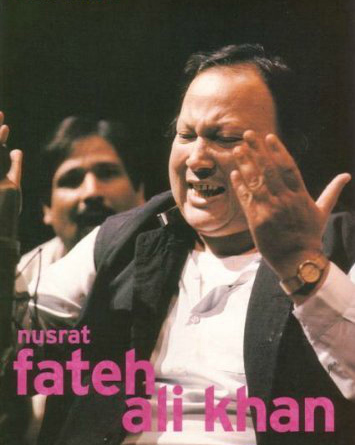The Fourth & Largest tenor - Nusrat Fateh Ali Khan dragging Qawwali into the 21st century
PHIL SWEENEY from “The Independent” calls Nusrat Fateh Ali Khan the best and largest tenor (the highest male singing voice) and recommend him over Luciano, Placido and Jose (most Popular Opera Voices of 90’s). Author goes on to describe his collaborations and innovative experiments which Though we know pretty well that “the best tenor” tag will never be enough to sum up the huge NFAK ( In each and every possible translation of this statement). Read this article for a great take on the “New Nusrat with his Experiments & Fusion”
Nusrat Fateh Ali Khan annoys purists, but he is also dragging Qawwali into the 21st century.
The Pakistani qawwali star Nusrat Fateh Ali Khan has been getting about a great deal lately. His remarkable quicksilver voice crops up increasingly on film sound-tracks - Oliver Stone’s Natural Born Killers, and recently Dead Man Walking (a pair of duets with Pearl Jam’s Eddie Vedder) and the entire score of the Anglo-Indian biopic Bandit Queen. Glimpses of the rotund divo in the international press have him wowing a new chic Indian audience of “famous surgeons, maverick politicians” and other “glimmerati” one minute (according to The Nation of Karachi) and in New York the next, grappling with psychobabble from celebrity interviewer and fan Jeff Buckley in Andy Warhol’s Interview.
Qawwali music’s most traditional function is a religious one, but it is far removed from the harsh anti-musical puritanism of extreme Islam. Like the related Persian dervish cult, qawwali induces ecstatic contemplation of the greatness of Allah and his prophets, in this case by the repetition and improvisation of sung religious poetry, some texts dating back to the 13th-century master Amir Khusrow. Qawwali’s natural setting is in the open, at one of the hundreds of shrines to Sufi holy men that dot the Indian sub-continent, where huge audiences are driven into trance by the cumulative repetition of a powerful word or phrase. Nusrat, a classically trained singer, son of a famous qawwal (a qawwali singer) and leader of his father’s former troupe for 25 years, excels at the compression of excitement into the sung word. He pioneered diversification away from classical Persian and Urdu into demotic languages like Punjabi and the inclusion of non-religious subject matter, but the true power of his qawwali is still experienced in a context closest to its origins.
Qawwali nouveau arrived courtesy of Nusrat and under the auspices of the Womad organisation and its Real World Records label. Nusrat entered the burgeoning “world music” scene soon after his first visit to the UK to play Pakistani concerts in 1979. In 1985, he performed at the third Womad festival, and in 1990, began an association with Real World, in effect producing a new and parallel range of products for the non-Asian market. Nusrat had and still has a continual output of top-selling traditional albums for an assortment of labels within Pakistan, and for the Birmingham- based company Oriental Star for Asian communities worldwide.
The first Real World release, overseen by the Canadian producer Michael Brook, substituted guitars, synthesisers and real and computer percussion for Nusrat’s usual group, and included a stripped-down dub remix of the qawwali classic “Must Must”, in which Nusrat’s voice was reduced to one sampled noise among others, cut and pasted at one point into semi-nonsense before the singer had it re-adjusted. Purists hated it, above all for its casual tinkering with sacred phrases, and Nusrat was accosted in the street with complaints. The singer believed in it, however, and persisted. Nusrat’s commercial acumen seems to have paid off, with the Real World album itself widely pirated within Pakistan, and a boom in remixed pop- qawwali rapidly ensuing. Subsequent re-renderings of “Must Must” include a version with heavy fuzz guitar, clarinet breaks and a female chorus; last year’s big Asian hit, “Must Mast II”, was replete with synthetic glockenspiels, Sergio Leone choruses, churning urns of disco funk and a minor spelling change in the title (apparently due to labyrinthine Pakistani copyright problems). The latest Real World model, Night Song, hit the shops this week, with a set of bite-sized love songs, not qawwalis, equipped with English titles and sensible modern-studio settings from the drawing board of Michael Brook to forestall complaints from religious purists.
Whether fusion qawwali will consolidate its hold on the genre is difficult to predict, with other top qawwali stars, like the public, divided. Aziz Mian, the so-called “poet among qawwals”, is avidly modernist, and worked last year with the London hip hop crew Fun-da-mental. The Sabri Brothers, despite a half-hearted stab at drum machines on one cassette, remain on the whole respectful of an audience they claim begs them not to experiment, though Real World are thinking of dragging them clapping and chanting into the 21st century with a remix job. As for Nusrat, with the youth market under his capacious belt, the logical move seems to be squarely for the jugular of Western adult entertainment. Move over, Luciano, Placido and Jose - make way for the fourth and largest tenor.
FRIDAY 29 MARCH 1996 “The Independent, UK”


Join the Legend's Legacy
Historical Discussions
Preserving memories from the past 1 contributions